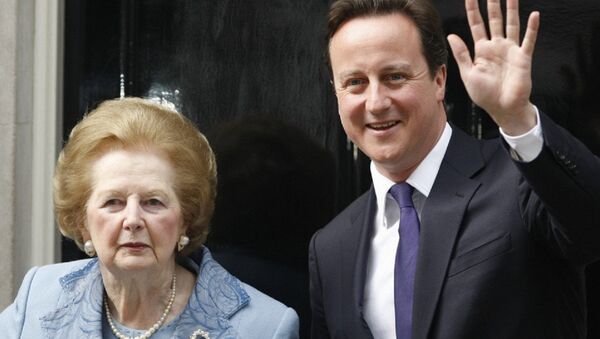Cameron is to set up a $29.5 million Good Governance Fund to strengthen democratic institutions across a series of Eastern European states. The move is based on the Know-How Fund set up by Margaret Thatcher following the fall of the Berlin Wall to help Poland and other former Soviet bloc states make the transition to democracy and free-market capitalism.
#EUCO cameron announces £20m good governance fund for post-soviet, post-yugo places. modelled on thatcher's 89 knowhow fund for poland
— Ian Traynor (@traynorbrussels) March 19, 2015
"The long-term interest for the UK is that we see strong and stable states on the borders of Eastern Europe," said one British official. "It is a long-term investment to prevent the next Ukraine."
The scheme will initially be focused on the former Soviet states of Georgia and Moldova and the ex-Yugoslavian republics of Serbia and Bosnia-Herzegovina, as well as providing continuing assistance to Ukraine.
The UK pays €21million for a "good governance fund" to build EU-type institutions in Georgia, Moldova Ukraine Bosnia & Serbia.
— Iain Mckie (@Iainmckie_UKIP) March 20, 2015
Officials said it will be used to provide technical assistance across a wide range of fields including tackling corruption, reforming police and justice systems, banking modernisation and tax reform.
"It is the building blocks of democracy, the strong institutions that give the people of that country a view that they are being looked after, they are not swung by possible intimidation or other messages coming from other countries," said one official.
"We've said to these countries that we want to support them on the transition to democracy. It shouldn't just be words," the official said.
No Guarantee of Unanimous Support for Further Sanctions
Cameron arrived in Brussels with a clear message that there should be no weakening of EU sanctions against Russia until it was clear that the Minsk ceasefire agreement had been fully implemented.
The sanctions are due to come up for renewal in July, and it is unclear whether there will be the unanimous support needed amongst the 28 EU member states for them to be renewed.
British officials however insisted that they remained an important "strategic weapon" — while pouring scorn on European Commission President Jean-Claude Juncker's suggestion that there needed to be a "European army". One official said:
"People have been talking about aspirations for European armies. We shouldn't be indulging in those fantasises when we have got a credible strategic weapon in the form of economic sanctions. We should be focusing on how we use them."


